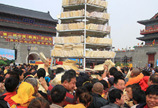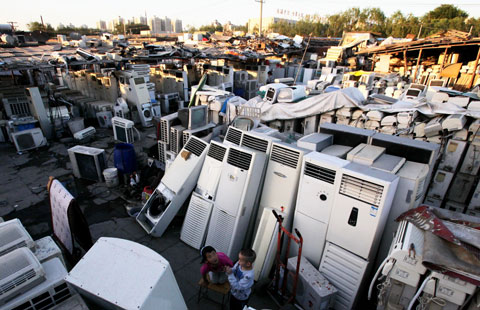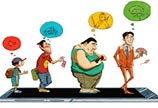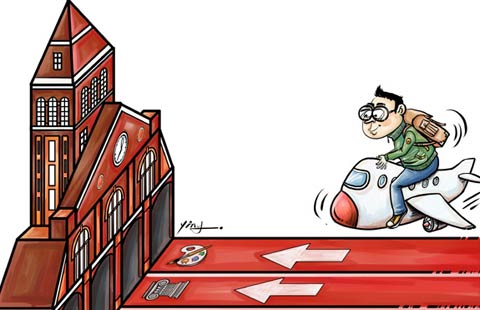Fake cigarettes stubbed out better jobs
By Peng Yining (China Daily) Updated: 2011-05-11 06:40Locals mired in poverty as economy yet to rise from the ashes, reports Peng Yining in Fujian province.
Wang misses the days in the 1990s when cigarette counterfeiting boosted the economy of his home, Yunxiao county, a mountainous backwater in Fujian province.
The 58-year-old former porter, who would not give his full name, said he could earn more than 5,000 yuan ($770) each month in 1995, when the average Chinese income was 350 yuan, by loading and unloading fake cigarettes.
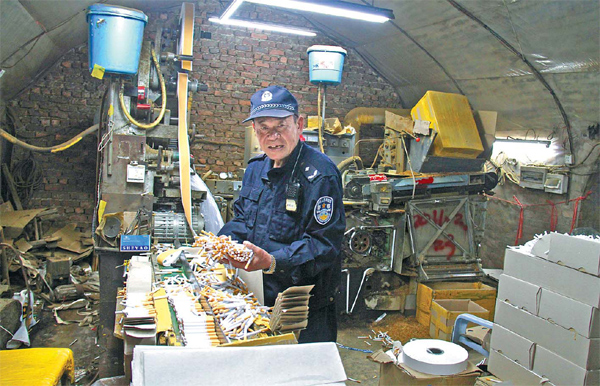 Thousands of fake cigarettes made in this bunker-like factory were confiscated Feb 25 in a raid by anti-counterfeit authorities in the hills of Yunxiao county. The local government is hoping new, legitimate industries will supplant the counterfeiting. This unidentified man works for the department that is trying to wipe out the illegal operations. [Photo/Xinhua] |
The traders "tipped me like millionaires", he said. "No. They were millionaires."
But the central government cracked down on illicit cigarettes, and Wang now earns less than 1,000 yuan a month as a rickshaw driver. He can't find a better job, he said, because long-term counterfeiting operations devastated legal industries in Yunxiao.
"Factories closed down because the workers all quit to produce fake cigarettes," said Luo Yuequan, 31, an official in the county's publicity department. "Children dropped out of school to work in house mills rolling cigarettes.
"The counterfeiting seemed to rescue people from poverty, but it didn't bring Yunxiao real fortune," he said. "On the contrary, it ruined the county's economy and future."
As the heartland of China's illicit cigarette trade, Yunxiao county in the 1990s annually produced more than 25 million packs of fake cigarettes, including bogus Chunghwa, considered a top-grade Chinese brand, and fake Marlboros and Newports for overseas markets.
While 10 packs of fake Chunghwa cost 30 to 80 yuan, they could fetch up to 10 times that amount in the open market. Ten packs (a carton) of legitimate Chunghwa cigarettes cost about 450 yuan. Local officials said in a report that by using low-quality tobacco and tax avoidance, counterfeiters made their profits easily rival those of the narcotics trade.
Traders in fake cigarettes swarmed to Yunxiao in the '90s from all over China, even the world. More than 100 hotels, including a four-star hotel, were built in the remote county with 400,000 residents to welcome them.
Luo said his father used to run a small fake cigarettes mill employing five to eight hired hands working in a tree-shaded tent in the hills.
"My father monthly sold a dozen boxes of cigarettes in Jiangxi province. His business was quite small, just for feeding his family and to send me and my two sisters to school," Luo said. "This is how the counterfeiting began, getting rid of poverty."
Tradition to industry
Yunxiao epitomizes the Chinese hinterlands, which are eager to shake off poverty at all costs. Before the cigarette business boomed, Yunxiao people struggled for a livelihood by planting loquat trees and harvesting the yellow fruit or by quarrying stones from the surrounding mountains.
"I remember that people occasionally rolled cigarettes with tobacco they purchased from outside to sell or exchange for rice when I was 8 years old," Luo said. "It came from the local smokers' tradition of homemade cigarettes."
In 1992, some villagers bought two cigarette-making machines and turned the tradition into a counterfeiting industry. Luo said 80 percent of village residents participated, and one-fifth of households opened their own cigarette workshops.
"People hid their machines in trucks, fishing boats and barns, but the sweet aroma of tobacco was so strong that you could smell it on any street in the county," he said.
It was the smell of fresh renminbi. The cost of cigarette machines and materials, usually less than 200,000 yuan, could be recouped after one month of production. Many residents made a killing from counterfeiting. If they were caught, the usual punishment was a few weeks in jail and possibly a fine.
Some local officials turned a blind eye to the illegal production and trade. Fang Zhenshan, director of the county's anti-counterfeit office, was arrested in 2001 for taking bribes and connivance and was sentenced to 14 years in prison.
Jobs up in smoke
Luo said Yunxiao was like a giant cigarette factory people divided the work into specialties: Some provided tobacco, some produced wrapping paper and some took charge of counterfeiting the trademarks. He said there was a group of "researchers" to analyze the ingredients of original cigarettes.
Luo, who has been smoking for more than 10 years, said he can't tell the fake and original cigarettes apart. "The packages look exactly the same, and I can tell the slight difference in flavor only if someone tells me which one is fake. Usually the real one smells lighter," he said. "Yunxiao can counterfeit any brand and quality."
Although the packages and taste are close, the fake cigarettes are made and transported in unsanitary conditions and emit higher levels of dangerous chemicals than brand-name cigarettes, according to a report released by the State Tobacco Monopoly Administration.
Yunxiao's counterfeiting also threatened China's cigarette industry by taking market share. The legitimate industry sells to 350 million smokers who consume 1.7 trillion cigarettes every year.
The administration began its crackdown in Yunxiao in 1998, and its operations continue.
Luo's father closed his factory in 1999 because of increasingly harsh punishments - years in jail, even life sentences. Luo's family picked up the long-neglected work of planting fruit trees, because there were no other jobs in town.
Yunxiao's old pillar industries - sugar, food canning and refrigerator factories - had closed during a decade of counterfeiting that drew profit-seeking participants from farming and other jobs.
Pocket money, plus
After the crackdown began, wealthy counterfeiters left the remote town and headed to big cities for other business. The people who worked for them saw their earnings cut off and had no place to go.
Yunxiao's economy suffered a stunning recession: The county's annual revenue dropped by 21.5 percent in 2001. In 2004, annual per capita industrial output was less than 600 yuan, according to official reports.
Unlike people in other remote townships in China, few Yunxiao people went to big cities as migrant workers. "If you could make money at home, why would you leave?" Luo said.
"I would definitely be a counterfeiter if my dad hadn't sent me to the army after high school. He didn't want me to take over his business. He said it was disgraceful work, no matter how much money it could bring in."
Luo said he earned 800 yuan a month working in a clothing factory in Quanzhou, a coastal city near Yunxiao, but wrapping cigarettes could easily bring in more than 3,000 yuan a month. Running your own cigarette factory was more lucrative.
Zhang Xiuxian, 21, also was eager to join the business. She told China Daily that counterfeiters will pay 0.6 yuan for packing 10 packs of cigarettes. "I saw 7-year-old kids doing the packing quickly and neatly," she said. "A skilled worker can easily make 60 to 70 yuan a day."
She said people could find packing opportunities by asking their friends or neighbors, because almost all of the 5,000 people in her village worked at counterfeiting factories. "Every day after school, my classmates went to pack cigarettes, making a little pocket money."
Lots of student quit school to make more money. Zhang said nearly one-third of her classmates didn't finish junior high school.
For fear of punishment, Zhang now works in a factory that makes jumbo television screens, part of the county government's project of developing an optical components industry to eliminate the fake cigarette industry.
Trying for turnaround
"People will give up counterfeiting only when they are able to find a legal job," said Guo Ling, director of the project, which was launched in 2007. She said county officials had to go into villages, knock on people's doors and try to persuade them to give up making fake cigarettes and go to legal factories. But 1,000 yuan in monthly wages were not attractive enough for locals.
"At first we only hired workers 18 years old to 35," Guo said. "Later the range expanded to 18 to 50, and now anyone with normal eyesight is qualified."
Chen Meiyu, 33, told China Daily that making fake cigarettes is profitable and unconstrained. Someone can work at home and take care of family and farmland at the same time, she said.
To attract housewives, who make up the majority of cigarette packers, government-supported factories allow female employees to take home their work, including spooling wires on reels and assembling components, so they can look after their babies while working.
The county also founded small village workshops and set up flexible work hours, catering to locals who are not used to a 9-to-5 schedule.
Fang Meiyan, 40, owner of a workshop producing small components for county factories, said she could find only four workers in 2009, but the number has increased to 40 with higher wages and the continued push against counterfeiting.
A report by the provincial anti-counterfeit department said that through 2009, the department had destroyed 2,793 fake cigarette workshops and had confiscated 8,505 tons of tobacco and 58,626 shipping cartons of fake cigarettes.
"There are only a few counterfeiting workshops left in Yunxiao," Zhuang Yutu, a senior officer, was quoted as saying in a journal produced by the tobacco administration. "They used to be easily found in every village, but now they are rapidly disappearing."
'A good start'
Authorities say they have made a significant dent in the industry, but its notoriety shadows county efforts to build a legitimate economy.
"We wrote more than 20 emails to a Hong Kong investor to explain Yunxiao is developing legal industries and is not making fake cigarettes anymore," said Fang Jianlin, deputy director of the county project. "It's hard to attract investments with a damaged reputation, and the counterfeiting might make a resurgence without the development of a legal industry based on investments. It's a vicious circle."
Luo Mingxiang, who founded a light emitting diode (LED) factory in Yunxiao in 2008, worries about the sale of his goods.
"It's not a good sign if your customers associate your products with fake stuff," he said. "And after decades of counterfeiting, the county's manufacturing is generally undeveloped."
"Yunxiao has paid a price for counterfeiting, but we will rehabilitate our reputation like many other Chinese cities did before," said Guo, the county's industry project director. In Fujian province, Jinjiang was once famous for counterfeit medicine, and Quanzhou was known for its fake clothing brands, she said, but now businesses are developing rapidly after going through uneasy industrial transitions.
"We have to change, as the counterfeiting won't bring long-term prosperity," she said. "I believe the optical component industry is a good start for Yunxiao. We already have invested 8 billion yuan, founded more than 160 factories, and provided over 18,000 work opportunities."
- Seven villagers murdered in N China
- China steps up tobacco control efforts
- Five jailed for separatism in Xinjiang
- Letter asks for leniency in poisoning case
- Antibiotics in surface water pose 'indirect health risk'
- Tianjin airport opens up transit link to Beijing
- High levels of antibiotics in China's major rivers
- China to dig tunnel for Asian rail system
- Bering strait line to US possible, experts say
- China: Stop oil rig harassment
